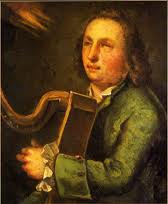Annotation:Fanny Dillon: Difference between revisions
No edit summary |
No edit summary |
||
| Line 16: | Line 16: | ||
</font></p> | </font></p> | ||
<p><font face="garamond, serif" size="4"> | <p><font face="garamond, serif" size="4"> | ||
''Printed sources'': '''Complete Collection of Carolan's Irish Tunes''', 1985; No. 37, p. 44. Neal ('''Collection of the Most Celebrated Irish Tunes'''), 1724; p. 28. O'Sullivan ('''Carolan: The Life, Times and Music of an Irish Harper'''), 1958; No. 37, pp. 122-123. Samuel, Anne & Peter Thompson ('''The Hibernian Muse'''), London, 1787; No. 11, p. 7. | ''Printed sources'': '''Complete Collection of Carolan's Irish Tunes''', 1985; No. 37, p. 44. Neal ('''Collection of the Most Celebrated Irish Tunes'''), 1724; p. 28. O'Sullivan ('''Carolan: The Life, Times and Music of an Irish Harper'''), 1958; No. 37, pp. 122-123. Samuel, Anne & Peter Thompson ('''The Hibernian Muse'''), London, 1787; No. 11, p. 7. Daniel Wright ('''Aria di Camera'''), London, 1727; No. 7. | ||
<br> | <br> | ||
<br> | <br> | ||
Revision as of 12:33, 18 December 2017
Back to Fanny Dillon
FANNY DILLON. Irish, Planxty (3/4 time). G Dorian. Standard tuning (fiddle). AB. Composed by blind Irish harper Turlough O'Carolan (1670-1738), who produced several tunes for the family (e.g. see "Lady Dillon"). Fanny Dillon was the daughter of Captain Gerald Dillon (see "Gerald Dillon"), and was the wife of James Betagh.

Donal O'Sullivan reconstructed the tune in 3/4 time from the Neal's 1726 publication, which he says "misquotes" the tune in common time. Other versions (collected by Bunting's assistant and by Bunting himself from harper Patrick Quinn) are in 3/4 time, but are not as complete as the Neal's tune. Additionally, O'Sullivan used the words set to the tune to help with the adaptation.
Source for notated version: The Neal's Collection of the Most Celebrated Irish Tunes (Dublin, 1726) [O'Sullivan].
Printed sources: Complete Collection of Carolan's Irish Tunes, 1985; No. 37, p. 44. Neal (Collection of the Most Celebrated Irish Tunes), 1724; p. 28. O'Sullivan (Carolan: The Life, Times and Music of an Irish Harper), 1958; No. 37, pp. 122-123. Samuel, Anne & Peter Thompson (The Hibernian Muse), London, 1787; No. 11, p. 7. Daniel Wright (Aria di Camera), London, 1727; No. 7.
Recorded sources:
